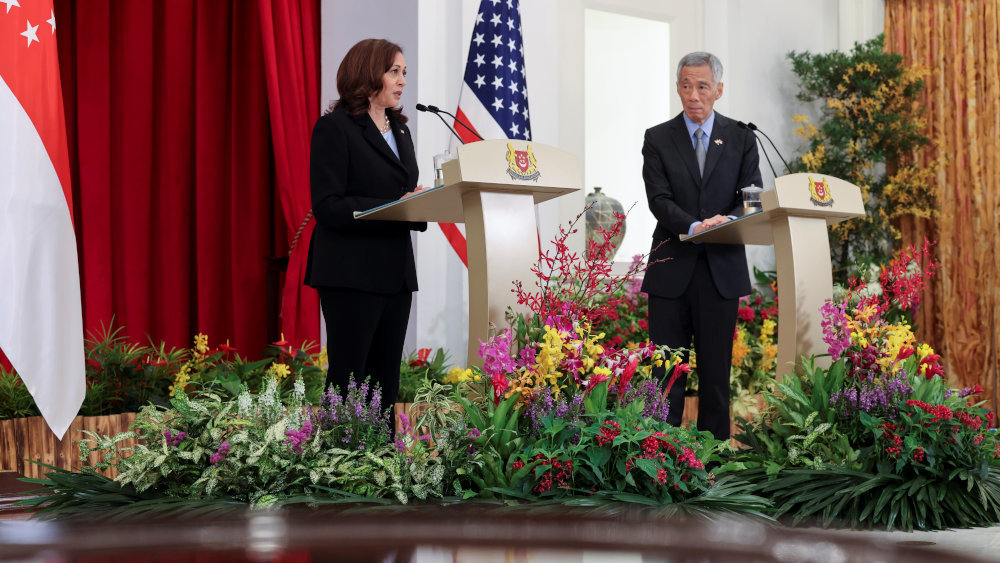SINGAPORE, (Reuters) – U.S. Vice President Kamala Harris said today during a visit to Singapore that the United States was focusing on evacuation efforts taking place in Afghanistan and that there would be plenty of time to analyse the context of the troop withdrawal.
Harris met with Singapore’s Prime Minister Lee Hsien Loong and President Halimah Yacob during a trip aimed at bolstering ties with partners in the region as part of Washington’s efforts to counter China’s growing economic and security influence.
“There is going to be plenty of time to analyse what has happened and what has taken place in the context of the withdrawal from Afghanistan,” Harris said during a joint news conference with Singapore’s prime minister.
“But right now we are singularly focused on evacuating American citizens, Afghans who have worked with us and Afghans who are vulnerable, including women and children and that is our singular focus at this time,” said Harris.
U.S. President Joe Biden has faced criticism at home and abroad over his handling of the withdrawal of U.S. forces and the chaotic evacuation after the lightning takeover by the Taliban.
“We hope Afghanistan does not become an epicentre for terrorism again,” said Lee, adding that Singapore had offered transport aircraft to help with evacuations.
Part of Harris’s task during the trip will be convincing leaders in Singapore and Vietnam that Washington’s commitment to Southeast Asia is firm and not a parallel to Afghanistan.
“Today, we are in Singapore to stress and reaffirm our enduring relationship to this country and in this region, and to reinforce a shared vision of a free and open Indo Pacific region,” Harris said.
Singapore’s Lee said that perceptions of U.S. resolve and commitment to the region would be determined by “what the U.S. does going forward, how it repositions itself in the region, how it engages its broad range of friends and partners and allies…”
Singapore is not a U.S. treaty ally, but remains one of its strongest security partners in the region with deep trade ties. However, it also seeks to balance its relationships with the United States and China by not taking sides.
The country is home to the biggest port in Southeast Asia, and supports continued free navigation in the area, where China is growing increasingly assertive – a concern U.S. officials plan to address during Harris’ visit to the region, which also includes a trip to Vietnam.
“I reaffirmed in our meeting the United States’ commitment to working with our allies and partners around the Indo Pacific to uphold the rules based international order, and freedom of navigation, including in the South China Sea,” said Harris.
The disputed South China Sea, a strategic waterway with potential oil and gas riches, has competing claims by China, Vietnam, the Philippines, Taiwan, Malaysia and Brunei.
The United States and Singapore reached security agreements on Monday that reaffirm America’s presence in the region through “rotational deployments of U.S. P-8 aircraft and littoral combat ships to Singapore,” according to a fact sheet of the meeting shared by the White House.
The United States and Singapore also agreed to expand cybersecurity cooperation in the financial sector, the military and enhance information exchange on cyber threats, according to details shared by the White House.
Cybersecurity has risen to the top of the agenda for the Biden administration after a series of high-profile attacks https://reut.rs/381vyis that affected fuel and food supplies in parts of the United States.
Other initiatives include starting a U.S.-Singapore dialogue on building supply chains.
The Biden White House is tackling a severe supply shortage of semiconductor chips in the United States that has seriously hurt car manufacturers and contributed to inflation.
The countries also struck a partnership to fight COVID-19 and prepare for the next pandemic and agreed to tackle the global climate crisis, promote smart cities and green building standards throughout ASEAN.
Harris will also visit Singapore’s Changi Naval Base and tour the USS Tulsa combat ship during the trip to Singapore.






